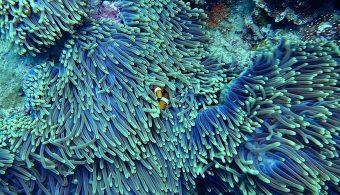
14 July 2016 – More than half of the world’s fragile coral reefs are under threat and most of our major fish stocks are now over exploited, according to the latest global assessments on the state of world’s high seas and large marine ecosystems launched today by United Nations Educational, Scientific and Cultural Organization (UNESCO)’s Intergovernmental Oceanographic Commission.
The new study identified the increasing cumulative impacts of climate change and human activities on these systems for the deterioration of their health and decline of resource productivity.
“Sixty percent of the world’s coral reefs are currently threatened by local activities; 50 per cent of all fish stock in large marine ecosystems are over exploited; 64 of the world’s 66 large marine ecosystems have experienced ocean warming in the last decades,” are among the among the alarming statistics from the assessment and detailed in a statement from UNESCO.
The findings were released today at the Headquarters of the Organization of American States (OAS) in Washington D.C., in the framework of the Trans boundary Waters Assessment Programme (TWAP), a project financed by the Global Environment Facility (GEF). The Programme undertook global assessments of the world’s trans boundary water systems, including the open ocean and large marine ecosystems, in order to support national decision makers and international organizations set priorities for policy interventions and develop a framework for future periodic assessments.
The statement also noted that the Intergovernmental Oceanographic Commission and the UN Environmental Programme (UNEP) released a suite of products from the TWAP data, including a full global assessment report and a more targeted version in summary form for policy makers.
“The findings from the open ocean and [large marine ecosystems] assessments present projections for disastrous escalation by 2030 and 2050 of the cumulative impacts of local and global hazards – from tourism to climate change – on marine ecosystems,” UNESCO said.
“The assessments nevertheless identify the important potential benefits of globally and regionally integrated governance to address these issues and should help strengthen countries’ capacities to conserve and sustainable use the oceans, seas and marine resources.”
Highlighting the contributions of large marine ecosystems to socio-economic development and to human well-being, UNESCO said those ecosystems alone contribute an estimated $28 trillion annually to the global economy through services and benefits provided by nature, including fish for food and trade, tourism and recreation, coastal protection from flooding and erosion, and the less tangible benefits from cultural, spiritual, and aesthetic connections to nature.
“Maintaining the health and resource productivity of these trans boundary water systems should help countries achieve global objectives to reduce poverty and hunger, and promote sustainable economic growth,” added the statement.
Some TWAP findings by the numbers:
Open Ocean:
60 per cent of the world’s coral reefs are currently threatened by local activities.
90 per cent of all coral reefs could be threatened in 2030 by the combined pressures of local activities and climate change.
100 international agreements currently “govern” the open ocean, signaling severe fragmentation.
Large Marine Ecosystems (LMEs):
64 of 66 LMEs have experienced ocean warming since 1957 (“Super-fast” warming in the Northwest / Northeast Atlantic and in Western Pacific).
28 per cent reduction in fish catch potential projected for high-risk LMEs in East Siberian Sea.
50 per cent of all fish stock in LMEs are over exploited.
Source: un.org



